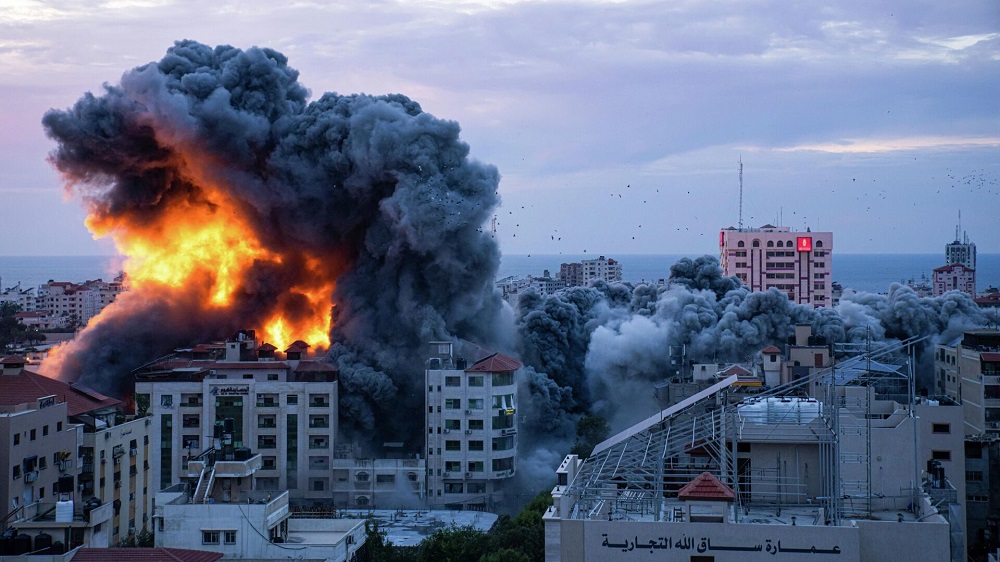Is the Middle East on the brink of a regional war? A view from Baku
Tensions in the Middle East
“After the assassination of Ismail Haniyeh, the Middle East is on the brink of a regional war,” say analysts from the Azerbaijani think tank “Şərqə baxış” (“Look to the East”). They believe that Iran is signaling its readiness to respond, while Israel threatens strikes on Iran’s strategic sites ahead of a potential large-scale attack. However, “despite pressure from Israel, the U.S. is not willing to repeat the mistake in Iran that they made in Iraq,” avoiding a scenario that could lead to uncontrollable outcomes.
“In a similar situation in April, the U.S. intervened and managed to de-escalate tensions in a controlled manner. This time, the U.S. is trying to pressure Iran to act with restraint in response to Israel’s actions,” the analysts state.
- Georgian political parties obliged to submit financial reports for the last 8 months
- Most of sale proceeds of Zamira Hajiyeva’s London property to be returned to Azerbaijan
- “Visa granted, but denied entry to the Schengen area”: Stories of Armenian citizens
“Recent events confirm U.S. influence in the Middle East”
“Overall, recent events once again confirm that the threads in the Middle East are still in the hands of the U.S. The mere entry of American aircraft carriers into Middle Eastern waters is enough to change the region’s dynamics. In short, despite the decline in U.S. military capabilities in the region over the past few years, their naval hegemony is sufficient to keep the Middle East within the American sphere of influence. Rather than triggering a new major war in the Middle East, the U.S. is interested in a controlled reduction of Israeli-Iranian tensions.
It is well known that Israel and the Jewish lobby have long pressured the U.S. government to resolve the Iranian issue once and for all. Israel argues that the regime of the mullahs in Iran is the patron of proxy groups threatening regional stability, and thus ‘the snake’s head must be cut’ before it acquires nuclear weapons, in order to calm the tense situation in the region.”
What would a regime change in Iran mean, and how might it happen? Could a regional war lead to regime change in Iran?
“Let’s assume that before Tehran acquires nuclear weapons, the U.S. decides to intervene militarily, bombing Iran’s strategic energy and military sites, thereby weakening the religious regime and leading to a regime change (though a ground invasion is highly unlikely). But who would come to power in Tehran?
For nearly 50 years, the West has not created, could not create, or did not want to create a political force that could serve as an alternative to the religious regime in Iran.
From time to time, Reza Pahlavi, the son of the shah overthrown by the people in 1979, is mentioned, with claims that the Pahlavi dynasty might return to Iran after the fall of the mullah’s regime. However, would the Pahlavis, who were exiled by the people, be accepted back in Iran, and could they establish stability in a country whose strategic sites have been bombed?
Given the presence of several separatist movements in Iran, a weakened central government could lead to decades of crisis and unrest in a country of 90 million people. Kurdish, Arab, and Baloch separatist movements that might flare up in Iran would also destabilize neighboring countries. The consequences could include millions of new refugees and a sharp increase in global energy prices.”
Does the U.S. and the West really need a divided Iran that would plunge the Middle East and surrounding countries into chaos?
“If we look at this from a rational perspective, no state would pursue a scenario that could lead to an uncontrollable outcome. For example, when Russia entered Ukraine in February 2022, it was undoubtedly prepared for the process after Zelensky’s overthrow, meaning they had a clear vision of who would take power.
The mindset of ‘Let’s just take this step and see what happens next’ is simply laying the groundwork for chaos. Similarly, when the Bush administration overthrew Saddam in 2003, it did not prepare a transition plan for Iraq. According to some claims, the Bush administration believed that the key was to remove Saddam, then the people would take to the streets, the exiled pro-Western Iraqi opposition would return, a transitional government would be established, and the problem would be solved. But, as many believe, the Bush administration’s main goal might have been to create chaos in the Middle East and the Islamic world… In any case, that’s a topic for another discussion.
Israel was particularly eager to overthrow Saddam at that time, portraying the Iraqi leader as the main problem in the region, arguing that a change of power in Baghdad would stabilize the situation. The U.S. intervened militarily, overthrew Saddam, and soon Baghdad came under Iran’s control. As with Iraq, a military intervention in Iran could lead to even greater problems for Israel in the Middle East.”
In the 2000s, such “experiments” were possible. The United States was at the height of its economic and political power, and a unipolar world system existed. But now, with China rising in the Far East and growing threats from Russia in Europe and China in Asia, it would be unwise for the U.S. to experiment again in the Middle East, where significant resources and time would be required. The idea of “preparing” American society, which is experiencing serious political and social polarization, for a new large-scale war in the Middle East and mobilizing tens of thousands of American soldiers for an invasion of Iran seems unrealistic.
In short, despite pressure from Israel, the U.S. administration is reluctant to repeat the mistakes it made in Iraq with Iran until there is a clear answer to the question: ‘What happens next in Tehran?’
Even if Trump, who provides maximum support to Israel and takes a very hardline stance against Iran, returns to power, it’s unlikely that the Pentagon would engage in a regional war with Iran. Overall, solving the Iranian issue through a regional war seems impossible.”





















